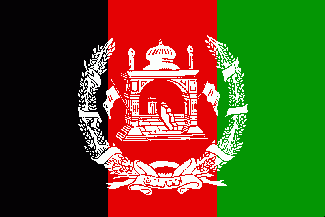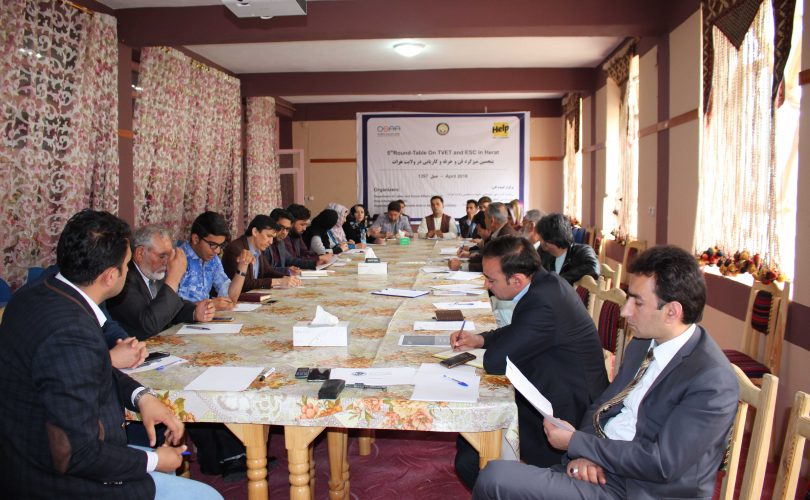Monday, April 23, 2018
Organization for Sustainable Aid in Afghanistan organized fifth TVET & Employment Round Table in cooperation with Help German INGO and in coordination with Herat DoLSA in Women Economic and Services Cooperative Conference Hall on Monday, April 23rd of 2018 in Herat province.
Given the National Labor Conference scheduled to be organized on May 1st 2018 in Presidential Palace, fifth TVET & Employment Round Table agenda was “Discussing Ideas and Recommendations to National Labor Conference”. Therefore, following topics were discussed during this meeting:
- Urgent employment strategies in Afghanistan;
- The role of the government to facilitate the conditions and enable the environment for job creation in the country;
- Policies for job creation in the country;
- The capacity to use the workforce in programs and projects;
- and establishing synergies between supply and demand sources of labor in the country.
Directors and representatives of Herat DoLSA, DoEco., Help INGO, Craftsmen Union, Mines & Industry Chamber, Herat Agriculture Institute, Experts Council of Herat, Labor National Union, Tolo-e-Dorokhshan Employment Center, Women Economic and Services Cooperative, representatives of Herat guilds, WFP, PIN, GP, DRC, NRC, SNI, OSAA, DACAAR NGOs and CSOs participated in this Round Table.
At the beginning, Mr. Sayed Ab. Tawab Hossaini, OSAA ESC manager, welcomed all participants and while outlining the outcomes of Forth TVET & ESC Round Table, he enumerated the goals of Fifth Round Table.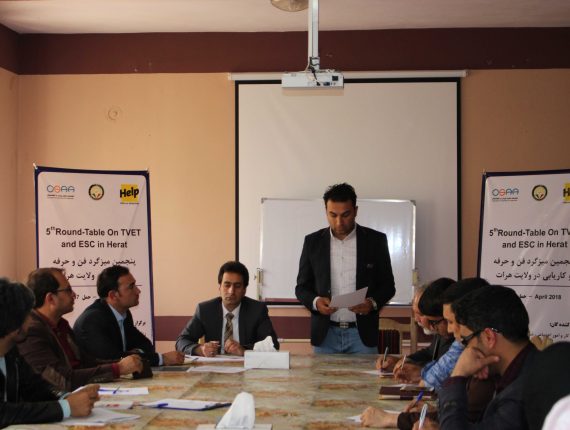
He said that based on conclusions of Fourth Round Table and after several meetings, ESCs and Herat DoLSA agreed on coordination, optimization and solidarity of activities among themselves in employment services arena. He also mentioned the Fifth Round Table goals which are collecting ideas, suggestions and recommendations of institutions and different sectors including government sector and institutions, private sector, CSOs and representatives of unions and guilds of Herat province to be transferred and presented in National Labor Conference.
Then, Mr. M. Ali Soroosh, Help Program Manager, talked on agenda of National Labor Conference. He described that the topics like “job creation, human capital development, increasing women participation in govt., special economic zones, job creation for returnees and IDPs, job creation in agriculture sector, rural development, industries and commerce, mining, construction and transport sectors will be discussed in the conference.
Then, participants discussed on above mentioned topics and shared their ideas and provided suggestions and recommendations on how to create jobs in different sectors and the role of government in facilitating appropriate conditions in this regard.
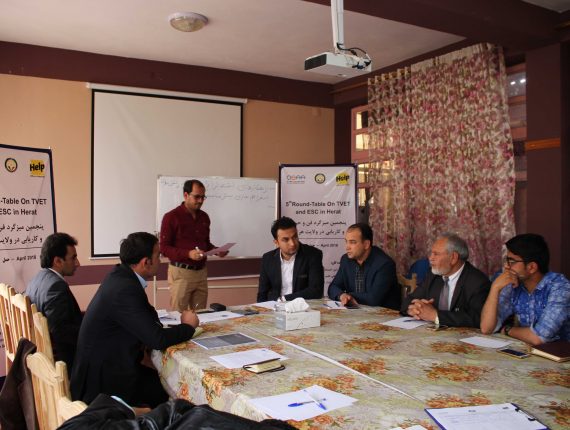
Participants’ views in this Round Table are summarized below:
- Support domestic products by imposing higher customs tariffs and prohibiting the importation of similar foreign products;
- Providing long-term, as far as possible, interest-free loans to entrepreneurs, especially to women, for setting up small businesses;
- Distribute government lands to boost the agricultural industry and create jobs for villagers;
- Establish a university of industry and technology in which majors related to modern industry and technology are trained to supply skilled individuals in line with the demand of the labor market and the progressing industries of Afghanistan and the region;
- Set up small businesses that generate revenue in short-term, with proper capital management and government support these businesses will change to big businesses with bigger revenue in long-term.
- Support to Afghan handicrafts that do not require enormous capital and their raw materials are abundantly available in the country and with low money and support will generate decent income for households. While large businesses require large amounts of capital and importation of raw materials from neighboring countries;
- Provide technical and practical vocational training in accordance with market demands;
- Facilitate provision of trainings, in particular, vocational and technical training in the districts of Afghanistan;
- Facilitate vocational and technical training for Afghan youth in neighboring and developing countries to learn special industry majors to decrease recruitment of skilled foreign labors and currency loss.
- Support and create a gratuitous loans fund for entrepreneurs who have successful business plans but have not been able to implement them due to lack of funding;
- Establish permanent market or exhibitions in provinces of the country for the supply and sale of home-made products that have not been able to have proper market due to the lack of such places;
- Set up social entrepreneurship programs at villages, districts, and provinces of Afghanistan taking into account relative advantage of each region;
- Attention and support to industries and products that increase exports;
- Enable and support home-made products by copying home-made products from neighboring countries;
- Prevent the import of low quality, unnecessary, and cheap foreign products that stop quality domestic products’ boom;
- Train domestic workers in accordance with the ILO standards and other accepted standards to export skilled Afghan labors to countries where labor force is needed in a mutual collaboration between the Ministry of Labor and Ministry of Foreign Affairs;
- The intensification of the fight against corruption, one of the main obstacles to investment in the country;
- Facilitate and shorten administrative and bureaucratic procedures, which is another serious obstacle to investment and growth of industry and production in the country; to this purpose, the laws and regulations relating to investment and industrial activities in the country must be reviewed, revised and supportive programs be provided to investors in order to encourage businessmen and investors to invest and start productive activities in the country;
- Emphasize on expansion of industries and implementation of labor-intensive projects (which require a large number of labors) and limit the use of fully automated machineries in the industry as much as possible;
- To invite companies whose products are marketable in Afghanistan and the countries of the region to launch their line production inside Afghanistan learning from developing countries, in particular, India; the launch of large companies in Afghanistan will create jobs for thousands of people and on the other hand, it prevents foreign currency loss;
- Attention to proper and effective management of projects and national and employment programs in the country;
- Conduct annual, comprehensive, and national labor market surveys/market studies by the government to identify saturated vocations in provinces and select new and marketable vocations for Vocational Training Centers (VTCs);
- Sign memorandum of understandings (MoUs) with the professional and technical institutes of the neighboring countries and the region for the purpose of experience exchange and training of industrial and updated vocations in Afghanistan;
- Strike balance between the educational system and the labor market of the country and the region;
- Apply proper procedures for recruiting foreign skilled labors – oblige them to train Afghans during their contract period and transfer their knowledge to Afghan labors;
- Choose a production-driven approach in addition to a trade-oriented approach by Afghan government;
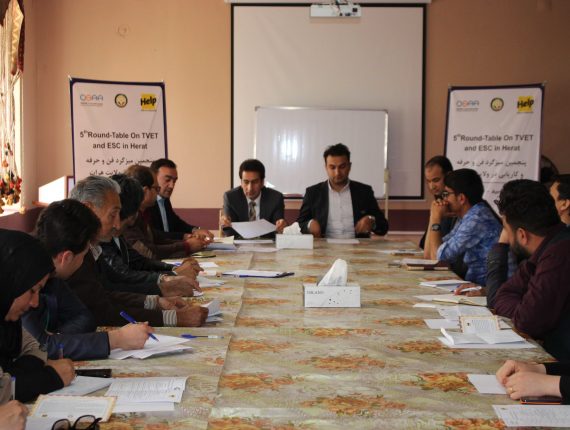 Multilateral government support of domestic industries and products in all sectors by policies, revision of laws and regulations, and support for entrepreneurs.In the end, Mr. Abdul Qayoum Afghan, Head of Herat DoLSA and Mr. Zabihullah Monib Taheri, Help INGO Country Director, wrapped up the discussions and concludedthe meeting.
Multilateral government support of domestic industries and products in all sectors by policies, revision of laws and regulations, and support for entrepreneurs.In the end, Mr. Abdul Qayoum Afghan, Head of Herat DoLSA and Mr. Zabihullah Monib Taheri, Help INGO Country Director, wrapped up the discussions and concludedthe meeting.
Both said that the comments and suggestions of the participants will be conveyed to the National Labor Conference in Kabul. The meeting ended with a prayer.
Source: Help Media and Culture Department
